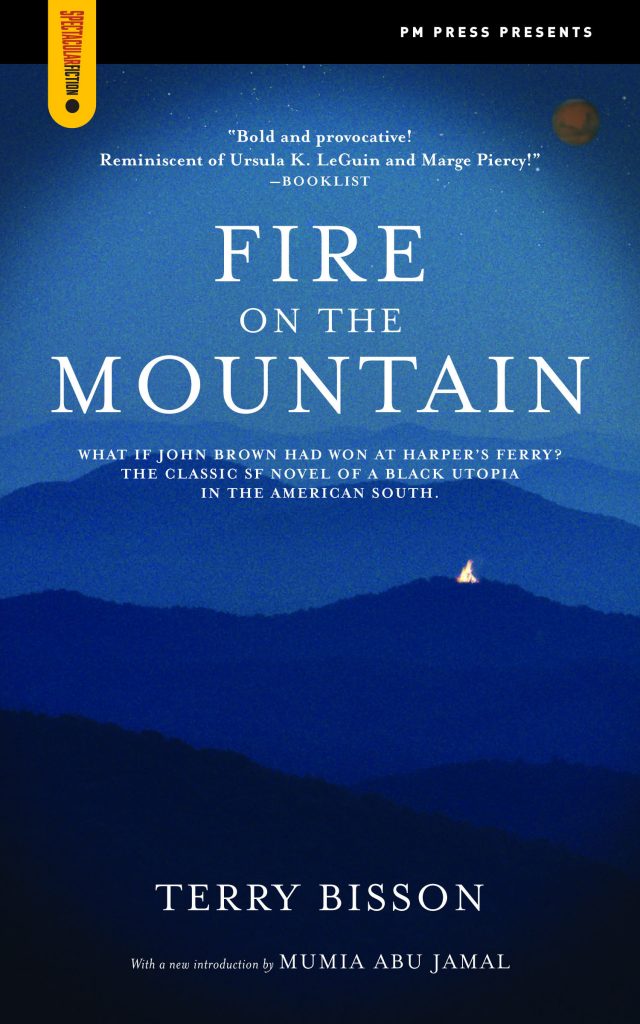By Marion Deeds
Fantasy Literature
October 17th, 2012
What if America’s Civil War had been, not a war of unification, but a war to end slavery? What if John Brown had succeeded at Harper’s Ferry?
In his short utopian novel Fire on the Mountain, Terry Bisson contemplates those questions.
Bisson’s story is simple and human, but he uses it to muse on how the
Civil War could have gone differently. Yasmin Abraham Martin Odinga is
an archeologist recently back from a dig in Olduvai, returning home to
Nova Africa. She is coming across the border into the United Socialist
States of America to visit Harper’s Ferry, where she is delivering her
great-grandfather’s memoir to the museum in that town. Yasmin’s
great-grandfather was a twelve-year-old slave when John Brown and
Harriet Tubman led their successful raid on Harper’s Ferry and started a
war of insurrection against slavery.
Yasmin is not terribly interested in history. She has her own issues. She is on the way to visit her mother-in-law and her daughter, and she has important news for them. It’s 1959, and the Pan-African Space Agency is about to land a manned spacecraft on Mars. Yasmin’s husband, Leon, was a cosmonaut and should have been part of the team, but he was killed in an EVA accident five years earlier. Pearl, her mother-in-law, and Harriet, her daughter, have both come to grips with this loss, but Yasmin is still stuck in her grieving, in largely because there is no grave for her husband.
The book shifts between 1859, the start of the Civil War, and 1959, using the Mars landing as a timekeeper for Yasmin’s narrative. Bisson is not overly concerned with how and why the various technological jumps were made, although we have space travel, television, computers and hydrogen-cell vehicles in 1959. His story is about people. In 1859, we follow Abraham’s memories of the beginning of the war. In order to let us know what was happening in the North (for example, what Frederick Douglass was doing), Bisson includes a set of letters from a Virginian plantation owner’s son who in studying medicine in Philadelphia. Thomas Hunter is an abolitionist. He hears Douglass speak at the Bethel Church, and forms a plan to take medical supplies south for John Brown’s guerilla army.
For the most part, Bisson works the alternate-present technology gracefully into this story. Yasmin brings Harriet a pair of “smart” shoes, shoes that “learn” her feet and change shape and color as desired. Yasmin’s borrowed hydrogen-cell vehicle breaks, requiring her to ride in someone’s battery-operated car. The only technological wonder that seems to be a real stretch is the Mars mission itself. Fire on the Mountain is a very short novel, practically a novella, and Bisson could have spared one more page (I think that’s all it would have taken) to explain the history of this global space exploration program a little more.
The most powerful part of this book is the narrative of Abraham, as he watches the birth of the Civil War. As far as slavery goes, Abraham doesn’t have it badly; his mother is something of a partner to the livery-stable keeper who owns her, running a café for him and keeping his books. When Deihl and his mother tell Abraham that they plan to move north, she stacks up the coins they’ve saved next to Deihl’s Bible and Abraham notices that the two are the same height. Just because he is not beaten or starved does not mean he is safe or any less a slave. Deihl has no problem sending a twelve year old boy to help recover the bodies of southern cadets who were ambushed by John Brown’s men — a horrendous task he wouldn’t have sent his son to do, if he had one. When Robert Lee cannot drive out or capture Brown’s men, he resorts to acts of terror in the town, hanging black men and women on an almost daily basis, and Abraham sees this each day.
Looking back from 2012, it’s easy to laugh at the idea of socialism taking hold in the US, but Bisson’s story was written in 1988, before the collapse of the Soviet Union. Bisson also imagines a smaller United States of America — the southeast is its own country, and Texas, Arizona and California have been annexed by Mexico.
Bisson is a master of creating intimate stories and deep relationships against truly different worlds, and Fire on the Mountain is a stellar example. The relationships reach symbolically across the century. Abraham talks about his cousin Cricket, who regularly visits the grave of his baby brother. Later, Abraham discovers that the grave is empty. One hundred years later, Yasmin mourns her husband, dead without a grave.
Message books are risky. There’s always the chance of being heavy-handed or preachy. Bisson falls into this trap once, with the book given to Yasmin by a malicious white supremacist, a book called John Brown’s Body. The museum curator, who has read the book, describes it as a “white supremacist fantasy” and goes on to talk about the imagined world where John Brown’s operation failed:
“It’s a white nationalist fantasy, and somewhat overdone. But you must admit, John Brown’s Body gives food for thought. What if the war had been started not by the abolitionists but by the slave owners? The political balance of forces was pretty precarious in the 1850s. What if the war had been fought to hold this nation together, instead of to free yours?”
Since Bisson used these questions as the jumping-off place for the whole book, this whole discussion is unnecessary.
Fire on the Mountain is a thought-provoking, politically flavored story that ultimately is heart-warming. It stayed with me after I turned the final page. I am glad this provocative little novel is available again. Presenting an alternative version of African American history, this novel explores what might have happened if John Brown’s 1859 raid on Harper’s Ferry had been successful. Chronicling life in a thriving black nation founded by Brown in the former southeastern United States, this dramatic story opens 100 years later, just as Nova Africa is poised to celebrate its first landing of a spacecraft on Mars. The prosperous black state will soon be tested when the granddaughter of John Brown returns from Africa to reunite with her daughter and share with her a secret that will alter their lives forever.







